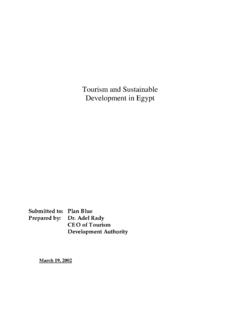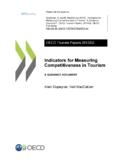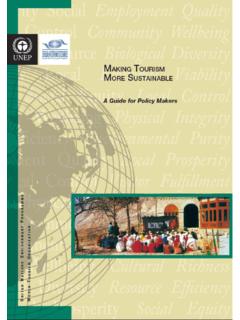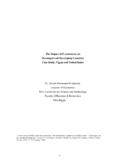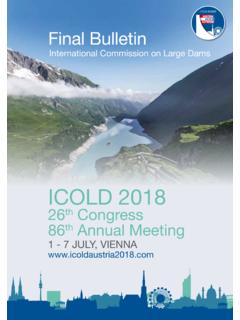Transcription of ACTIVE WITH - OECD
1 MENAACTIVE WITHTHE MIDDLE EAST AND NORTH AFRICATHE MIDDLE EAST AND NORTH AFRICA AND THE OECD: a mutually beneficial partnershipThe Middle East and North Africa (MENA) is a diverse region whose development potential has yet to be fully unleashed. Despite current geopolitical challenges, countries in the region benefit from a privileged geographic location situated at the crossroads of Europe, Africa and Asia; a young and increasingly educated population; and great potential in sectors such as renewable energies, manufacturing, tourism, and business development services. Over the past decades, MENA countries have implemented reforms to increase economic openness, diversification and private sector development . Those reforms initially led to increased investment, trade and economic growth; but they were also incomplete and did not fully tackle broader structural economic and social issues.
2 There is a need for more comprehensive reforms aimed at adopting inclusive and sustainable development models that offer better opportunities for all, notably for the young generation and for women. The transformation process remains unfinished and there is a continued demand from society for effective change. Developments such as the decrease in hydrocarbon prices accentuate the necessity of structural reforms in some countries, while it offers a window of opportunity to others. More importantly, conflict and the refugee crisis stress the need to regain stability, initiate reconstruction and provide opportunities for immigrant and host populations alike. The OECD is actively engaged in supporting MENA countries in the design and implementation of ambitious reform agendas. The strong cultural and economic ties shared by MENA and OECD countries are the foundations of a decade-long partnership with the region.
3 Building on internationally recognised tools, standards and work methods, this partnership has pioneered policy dialogue, peer learning and capacity building at the regional and country levels. It has focused on investment, public and corporate governance, decentralisation, transparency, integrity, SMEs and entrepreneurship, among other issues. The MENA-OECD partnership has also fostered greater participation of non-governmental voices such as civil society and private sector representatives. It has also benefitted from increased co-ordination among international organisations, development banks and other multilateral institutions. At the centre of the partnership is the MENA-OECD Initiative on Governance and Competitiveness for development , launched in 2005 as a platform for joint work at the regional and country levels. with an extended mandate for 2016-2020, the fruitful and intense MENA-OECD co-operation will continue evolving to adapt to the development priorities of the region.
4 Over the next five years our partnership will prioritise strategic areas including regional integration as a natural step for a better participation in the world economy and global value chains; nurturing sustainable and inclusive economic growth; strengthening governance; strengthening stability, peace and security; and importantly, fostering the participation of youth and women in the economy and public life. The partnership will further align our work with global efforts such as those reflected in the 2030 Agenda for Sustainable development and the Sustainable development Goals. The OECD is proud of its ten years of co-operation with the region, and this brochure testifies to the scope and depth of our work together. In this challenging time, the OECD is committed to working even more closely with MENA economies to bring better policies for better lives and inclusive growth across the GURR A, OECD Secretary-GeneralCONTENTS.
5 1 PUBLIC AND CORPORATE GOVERNANCE 41 Strengthening the rule of law 42 Strengthening integrity and accountable governance 43 Building open and innovative governments 45 Risk management 47 Raising the bar on corporate governance of private and state-owned enterprises 48 INDUSTRY AND INNOVATION 49 Building a knowledge economy 50 Supporting SME development and entrepreneurship 51 Fostering infrastructure investment and public service delivery through public-private partnerships 52 ENVIRONMENT AND ENERGY 54 Promoting green growth 55 Combating climate change 57 Improving water governance 58 Ensuring access to reliable and clean energy 59 ANNEXES 61 Participation in OECD bodies and intergovernmental activities 61 Adherence to OECD legal instruments 62 Participation in initiatives and networks 63 Dialogue and data 63 THE OECD AND THE MIDDLE EAST AND NORTH AFRICA 2 The MENA-OECD Initiative on Governance and Competitiveness for development 5 Support for Improvement in Governance and Management (SIGMA)
6 10 The Deauville Partnership 11 The Morocco Country Programme 13 Promoting effective development co-operation 14 A SUSTAINABLE AND INCLUSIVE GROWTH AGENDA 18 Implementing structural reforms for economic diversification and sustainable and inclusive growth 19 Building resilience in post-conflict situations 21 Enhancing youth skills, employability and inclusion 23 Tackling gender inequality 25 Fostering skills through education and training 27 Fostering regional development , sustainable cities and urbanisation 28 Increasing agricultural productivity and food security 29 SMOOTH FUNCTIONING OF MARKETS 30 Enhancing the investment environment 31 Promoting trade and integration in global value chains 32 Fostering sound competition 34 Improving financial education 35 BUDGETING, REVENUE COLLECTION AND EXPENDITURE 36 Improving revenue collection and fiscal management 37 Enhancing tax transparency and compliance 38 Strengthening budgeting and public procurement 39 CONTENTSC ontentsTHE OECD AND THE MIDDLE EAST AND NORTH AFRICA2.
7 ACTIVE with MENAFor millennia the MENA region has contributed to the historical, scientific and cultural progress of humanity. It is home to a youthful and dynamic population, holds a significant share of the world s energy resources, and has the potential to boost trade and investment links around the world. The region also faces well-known challenges such as low economic diversification, an imperative need to improve education systems and infrastructure, complex political and governance scenarios and persistently high barriers to the economic and social wellbeing of important sections of society. The fragile and unstable situation in several MENA countries and the geopolitical tensions in the region have added to the complexity and urgency to addressing those challenges in a sustainable manner. The OECD is actively engaged with MENA partners in addressing those challenges through well-proven work methods of regional dialogue, peer-learning and support for reforms.
8 THE OECD AND THE MIDDLE EAST AND NORTH AFRICA . 3 THE OECD AND MENA4 . ACTIVE with MENAThe Initiative facilitates co-operation between the OECD and the MENA region to promote policies for sustainable and inclusive growth. It addresses regional needs and development priorities, including the integration of women and youth through jobs and greater participation in policymaking. It also takes into account the region s diversity by providing targeted support to individual countries. The Initiative builds on the OECD s work method of policy dialogue, exchange of good practices and capacity building for the implementation of reforms. Created at the request of MENA countries, the Initiative brings together MENA and OECD governments, the international community, civil society and the private sector. The Initiative is composed of two pillars, the MENA-OECD Governance Programme and the MENA-OECD The MENA-OECD Initiative on Governance and Competitiveness for DevelopmentCompetitiveness Programme, and is governed by a steering group providing strategic guidance.
9 The Initiative adopts a horizontal approach to high-level dialogue and consensus building with working level technical assistance, analysis and capacity building through specialised policy networks. It deepens its impact through co-operation with regional and international partners and aligns its efforts with other international platforms. The mandate to 2020 of the Initiative focuses on:l Supporting regional economic integration to reduce economic fragmentation and facilitate countries integration into global value chains (GVCs). MENA-OECD INITIATIVEG overnance ProgrammePublic sector reforms for quality services, inclusive policy making and transparencyCo-operation with regional/international partnersAfDB, The League of Arab States; European Commission; WB, IMF; AMF; UNDP; with international initiativesDeauville Partnership; SIGMA; Open Government Partnership; DAC-Arab providers of development co-operation; etc.
10 Competitiveness ProgrammeMore and better investment and private sector development for inclusive and sustainable growthSteering group (chairs: Tunisia, Spain and Sweden)Regional and national support throughA) Policy assessmentB) Policy dialogue C) Policy advice and capacity buildingTHE OECD AND THE MIDDLE EAST AND NORTH AFRICA . 56 . ACTIVE with MENAl Advancing the development of countries in a fragile or conflict situation through the sharing of knowledge, good practices, and support in reform implementation. The Initiative covers Algeria, Bahrain, Djibouti, Egypt, Iraq, Jordan, Kuwait, Lebanon, Libya, Mauritania, Morocco, Oman, Palestinian Authority, Qatar, Saudi Arabia, Tunisia, United Arab Emirates and Fostering shared and inclusive economic growth through policies to support decentralisation, greater investment in infrastructure, economic diversification, productivity and greater inclusion of women and Strengthening the Initiative s linkages with the wider development agenda through global initiatives such as the Sustainable development Goals (SDGs) and deepened partnerships with regional and international organisations.










